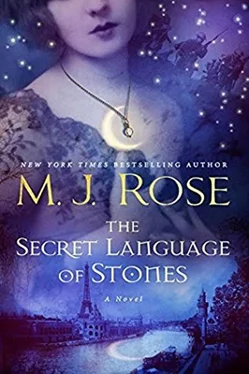He’d opened it.
“No, don’t, it’s-”
He stared at me. My tone had been too harsh. What was wrong with me that I was so anxious? Grigori was a fine arts and antiques dealer-he knew how to handle precious objects. Was it just that I always worked alone and found his presence distracting? Or was I sensing something about the tsar’s children I didn’t want to face yet and felt uneasy because of them?
Grigori inspected the contents, taking them out and putting each on the desk blotter. First the locks of hair, four of them tied with lavender ribbon, one with navy. Next the tooth. Then the grosgrain ribbon.
His face gave away nothing, and he remained silent as he continued searching through the contents.
“Grigori, please don’t. If something has happened to the children, what you’re doing is like rifling through their coffins.”
“What a strange thing to say.” His eyes softened. “How hard this must be for you. Spending so much time working the remains of the soldiers. Hearing their voices. I’m sorry I’ve never really asked you about it before. Does it seep into your dreams?”
Twice in one day now, someone had asked me almost the same question.
I nodded.
“Tell me.”
“No, not now.”
“Imagine the value you could place on your service if you could ask them questions and they could answer you. Have you ever tried that?”
I couldn’t tell if he was teasing or serious.
“No, I haven’t. I just accept the messages. It’s not the same as having a conversation,” I said. Or at least it hadn’t been, I thought, until I’d met Jean Luc.
“You should at least get paid for what you do.”
“We charge for the piece of jewelry.”
“You should get a fee for the readings as well.”
Grigori was a good salesman. I’d been in the shop when he’d charmed clients into paying high sums for a candelabra or an armoire. Several times, I’d heard Monsieur admonish Grigori for being too greedy, but I’d written that off to the friction between them. Was I wrong? Since we’d arrived at the castle, Grigori didn’t seem the same to me. Was he more himself on his own, out of his father’s orbit, and I was seeing it for the first time?
“Are you uncomfortable being here?” I asked.
“Uncomfortable?” he asked. “No, the accommodations are fine. Aren’t yours?”
“No, I meant being away from Paris, here in the country, at this castle, on this mission. You seem anxious and perhaps a little angry.”
Grigori frowned, and then, like the sun rising, one of his sparkling smiles transformed his pensive face. “I’m sorry. And yes, I am anxious. I am worried about what you will discover when you finish that charm.” He pointed to my work. “I suppose I’m finding it intimidating to be around the Dowager, to be in the same house as her. And I’m concerned she has traveled all this way and you will have to give her bad news. And then we will have to witness her grief. And somehow my father will find a way to make even that my fault.”
It all made sense, but as he said it, his eyes kept returning to the ruby enamel egg necklace I wore.
Without meaning to, before I realized what I’d done, I’d put my hand up, protectively covering the piece, and examined yet again the subterfuge of wearing this necklace over the other. Of the request to give them to the Dowager, but only when we were alone.
“Is that a new piece of jewelry?” Grigori asked.
“It is. Your father gave it to me for luck.”
And the greatest question: Why hadn’t Monsieur wanted his son to know about the real gift? I’d accepted his logical answer, but I wasn’t sure I believed it.
Inadvertently, I shook my head.
“What is it, Opaline?”
“Nothing, I should get back to work or I won’t finish.”
“I will leave you then. When do you think you’ll be done?”
“By dinnertime as promised.”
I wished I didn’t need to read the talisman until the next day. If it was bad news, I preferred giving it to the empress in daylight, when she wouldn’t have a long lonely night ahead of her. But time, I knew, was of the essence. No one was aware the empress had left Yalta. For her to be away for more than a few days invited danger.
Monsieur had said it over and over again: the Bolsheviks’ hate knew no bounds. The world feared for every member of the tsar’s family. And I for this strong, lovely woman most of all.
Once Grigori left, I put down my tools and stood to stretch. His presence had affected me, almost as if the storm clouds from the outside had come in. I rubbed my forehead, feeling the beginnings of a headache coming on. There must be aspirin powder in the house. That would help. Unless of course this was the first harbinger of the fate of the children.
I closed the door, locked it, pocketed the key, and took off for the kitchens. But the castle stretched out too far and the hallways twisted too many times and there were too few lamps lit for me to easily find my way. As I wandered, the shadows danced in macabre patterns, portraits on the walls sang to me, and objets d’art buzzed or murmured.
Maybe Grigori was right and I’d spent too much time invested in the dead. But hadn’t everyone in France? In England? In every country in Europe? The four-year-long war had claimed an unfathomable number of men. Not just unimaginable to me, but to all of us. You could picture a room with a dozen people in it. A theater with a thousand people in it. But enough men to fill a thousand theaters?
I’d managed to reach the main floor of the castle but wound up lost, following a darkened, narrow hallway that seemed to go on interminably. Retracing my steps, I tried to get back to the main staircase. From there, I would try again to find the path to the kitchens. After five more minutes of wandering, I found myself in a gallery.
The room was as long as a half dozen normal rooms and twice as wide as one. The walls were hung with portraits. As I made my way down its length, every ten feet or so I passed under another elaborate crystal chandelier. None of them lit, none of them glittering, but all of them emitting a high-pitched crystalline keening. As if the very crystals were weeping with grief.
With only gloomy daylight filtering in through the occasional windows, I peered into the faces of these noblemen and women, some going back to the fourteenth century. All of these people, I thought, were dead. Like all the souls in Père-Lachaise were dead. Like all the soldiers were dead. Like Jean Luc was dead.
Darling, you are becoming morose.
Jean Luc! I smiled despite myself.
I can go wherever you go, but I’m not happy about being here.
“Why is that?”
Because you aren’t happy here. Something is bothering you.
“How can you know?”
I think sometimes I can hear things you are thinking before you acknowledge them.
“Is that possible?”
Is any of this possible?
I smiled again. “It shouldn’t be, but it is. I still wonder sometimes if I invented you. The way children invent imaginary friends.”
Haven’t I proven myself to you?
“I would have thought so. But you’re hard to believe in-even with everything you’ve shown me and all that my mother and Anna have explained, a part of me still believes reading the stones, getting the messages, could be some manifestation of madness. The mind is more powerful than scientists and doctors know and-”
Please stop.
His voice sounded terribly sad, with much angst in just those two words.
“What is it?”
My presence is making life more difficult for you, and I can’t bear that. I don’t want you to miss me and long for me. I didn’t come this far to find you in order to hurt you. All my men dead and my mother suffering and now you are questioning your own sanity.
Читать дальше












